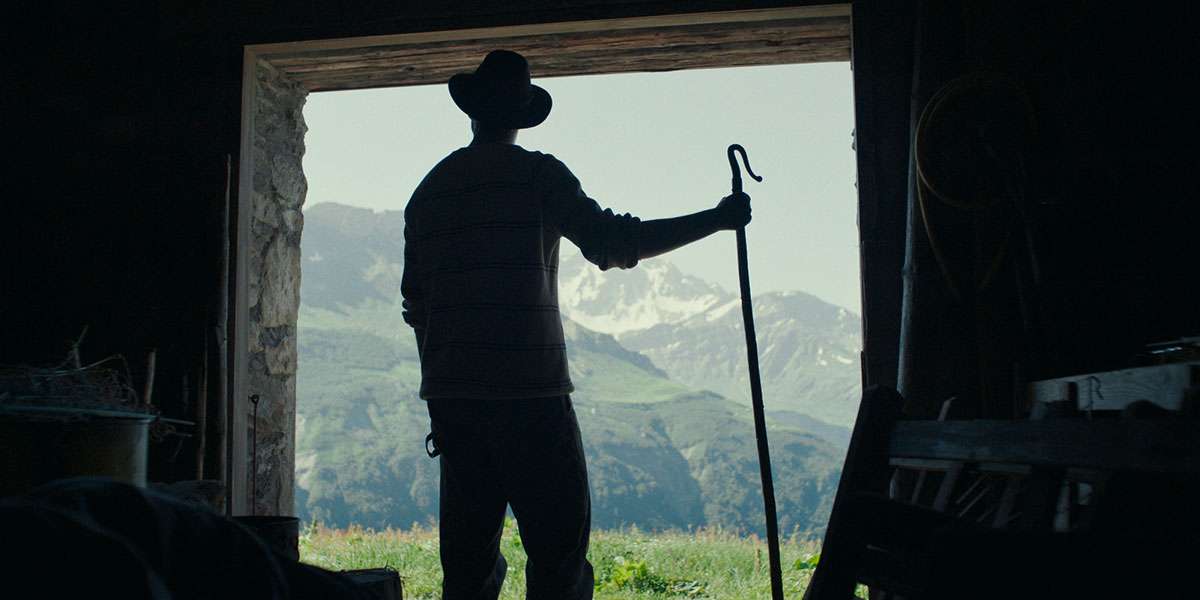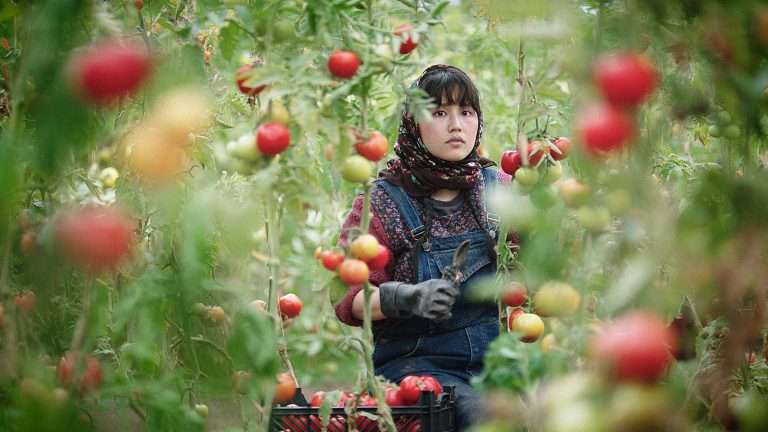Some movies invite me into its slow, dreamy rhythm precisely because of its unhurried air without any hint of pretension. All coming-of-age narratives lead with a note of realization, but very few movies explore the abject downbeat nature of such realizations without resorting to blaring background scores or sheer melodrama. “Bergers” (or “Shepherds”) by Sophie Deraspe is all about a lack of hurry to get to its point. It is playing within a familiar sandbox of coming-of-age narrative.
Based on the semi-autobiographical novel D’où viens tu, berger? (Where do you come from, Shepherd) by Mathyas Lefebure, Bergers follows Mathyas (Felix-Antoine Duval), a burnt-out advertising executive who quits his high-paying job in Quebec, Canada, and moves to the district of Provence to become a shepherd. His conviction on following his passion leads him to form a connection with a bureaucrat at the administrative office, Elise (Solen Rigot), who also leaves her job to join him at his pastoral vocation, only for the two of them to realize that the grass isn’t as green on the other side.
It’s, as remarked previously, a familiar template. Deraspe also doesn’t play much with the screenplay format to invite any form of subversion, except in inducting the realism of the pastoral life as a step forward for Mathyas to identify his passion and how to convert that to a professional career. Deraspe shows the eventual erosion of Mathyas’ rose-tinted glass look of pastoralism through four different vignette-structured acts.
In the first act, Mathyas has to brave the shepherds’ skepticism and face failure simply because the shepherds are too busy in harvest season to allot time for dead weights. The second act shows Mathyas joining old man Tellier’s farm, working as a shepherd and learning how to live the pastoral life but also realizing the searing loneliness and psychological toll of such an endeavor, which leads to unpredictable cruelty exhibited by the humans in charge of the flock, along with nature already exhibiting its unforgiving claws.
Deraspe also doesn’t shy away from showing how unprepared Mathyas is for the reality of pastoralism, even though the entire endeavor is also for Mathyas to write about this career change as a novel. The lesson is in realizing how his charisma, an identity developed due to being a combination of his good looks and experience in the gift of the gab, is nowhere near as compelling as sincerity, which nature ultimately forces him to realize.
However, he is also aware enough in his letters to Elise that he is introducing a facade of fiction and romanticism to his travails as a berger, which ultimately convinces her to join him. But her joining coincides with an event in Mathyas’ life that forces him to leave the job as a berger and join up, with Elise and their trusty dod Lola in tow, as a pair of berger shepherds under the employment of Cecile Espiriroux (Guiliane Londez). This stretch of the movie is the closest to the movie feeling conventional in depicting the pastoral life, at least in terms of its romanticism. But there is also a sense of growth for Mathyas’ character, as he begins to teach Elise about the basics of that world and also learns that she is a very quick study.

The centrepiece of the film is the transhumance sequence, where Espiriroux’s sheep, along with sheep from other farmlands, converge in the journey towards the highlands of the Alps mountains—a seasonal cycle that is both surreal and heavenly in its exploration of the juxtaposition of modernity (cities, cars, footpaths, bridges) with a profession as old as time (sheep walking through the cobbled city streets, herded by the shepherds).
It’s a gorgeous sequence, accentuated by the feathery background score by Phillipe Brault and the cinematography by Vincent Gonneville. While Gonneville is aided tremendously by the natural beauty of the Alps highlands, his cinematography, especially his lighting, shines in the darkened sequences, especially in the interiors like the cabins or the sheep pens, and in how he frames the sheep as wistful creatures who are both delicate and yet unpredictable.
The movie never entirely leaves the strain of romanticization of pastoralism, but Deraspe deftly manages to integrate nature’s unpredictability and the harsh reality of shepherding into the narrative itself. It allows for both Mathyas and Elise’s characters to grow closer and acknowledge their love for the mountains, away from the tendrils of social media, while simultaneously acknowledging the hardships associated with such a life and how enough planning and experience can’t account for the presence of wolves or the wind speed of a ferocious storm.
Like every passion, the love for the field is essential, and it’s that evolution for Mathyas and Elise that only occurs post-transhumance that genuinely feels like the film’s emotional core. I would have loved a deeper exploration of the modern automated processes of farming encroaching the natural order that is being hinted at in the film between conversations or a bit more process-oriented filmmaking that Deraspe utilizes in the first act but slightly foregoes in the final act.
But even taking into account these criticisms, one of the prime attractions of movie-watching for me nowadays is whether the topic being explored can offer me something new even when operating under traditional storytelling mores. The wistful, charming, and yet exceedingly realistic tone of pastoralism proves that such a feathery, subtle treatment of the coming-of-age narrative is also possible.
Shepherds (Bergers, 2024) premiered at the 2024 Toronto International Film Festival.
Shepherds (Bergers, 2024) Movie Links: IMDb, Wikipedia, MUBI
The Cast of Shepherds (Bergers, 2024) Movie: Félix-Antoine Duval, Solène Rigot




![T for Taj Mahal [2019]: ‘Jagran Film Festival’ Review – A Sisyphean struggle to provide education](https://79468c92.delivery.rocketcdn.me/wp-content/uploads/2019/09/T-For-Tajmahal-768x403.jpg)
![Monica, O My Darling [2022] Review – Vasan Bala’s Nostalgia-induced mystery is a rambling mixed bag](https://79468c92.delivery.rocketcdn.me/wp-content/uploads/2022/11/Monica-O-My-Darling-2022-Netflix-Movie-Review-1-768x456.jpg)
![Munich – The Edge of War [2022] ‘Netflix’ Review: Yet another plea to Oppose Fascism before its too Late](https://79468c92.delivery.rocketcdn.me/wp-content/uploads/2022/01/Munich-The-Edge-of-War-2022-768x432.jpeg)
![Brothers’ Nest [2018] Review – A Darkly Funny and Interminably Tense Family Dispute](https://79468c92.delivery.rocketcdn.me/wp-content/uploads/2019/02/Brothers-Nest-2018-768x432.jpg)

